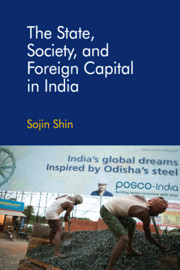Book contents
- Frontmatter
- Dedication
- Contents
- List of Tables, Figures, Illustrations, and Maps
- Acknowledgements
- 1 Introduction
- 2 FDI Inflows in India: Ideas, Interests, and Institutional Change
- 3 FDI Inflows in Tamil Nadu: Inclusionary Ideas, Weakened Interests, and Incremental Institutional Change
- 4 Making FDI Work in Tamil Nadu
- 5 FDI Inflows in Odisha: Weakened Ideas, Strong Interests, and Unstable Institutional Change
- 6 Making FDI Work in Odisha?
- 7 Conclusion
- Bibliography
- Index
5 - FDI Inflows in Odisha: Weakened Ideas, Strong Interests, and Unstable Institutional Change
Published online by Cambridge University Press: 08 July 2018
- Frontmatter
- Dedication
- Contents
- List of Tables, Figures, Illustrations, and Maps
- Acknowledgements
- 1 Introduction
- 2 FDI Inflows in India: Ideas, Interests, and Institutional Change
- 3 FDI Inflows in Tamil Nadu: Inclusionary Ideas, Weakened Interests, and Incremental Institutional Change
- 4 Making FDI Work in Tamil Nadu
- 5 FDI Inflows in Odisha: Weakened Ideas, Strong Interests, and Unstable Institutional Change
- 6 Making FDI Work in Odisha?
- 7 Conclusion
- Bibliography
- Index
Summary
Direct foreign investments in the exploitation of raw materials have involved powerful societal actors and a wide range of governmental institutions and have touched upon issues of major importance to the state … Central decision-makers may be frustrated not only by other states but also by their inability to overcome resistance from within their own society (emphasis added).
Odisha is one of India's provincial states located on the eastern coast, having abundant resources, especially for the steel and mining industry. Because of its locational and market advantage, many of the Indian domestic and foreign firms have attempted to embark upon their business in the state's resource-extractive industries. Despite such industrial demand, Odisha has long remained as one of the most backward states in India.
However, the state's recent initiative in boosting economy through the private investments seems quite resolute. In 2015, the Government of Odisha issued the Industrial Policy Resolution (IPR) to create a conducive environment through an enabling policy and regulatory framework to drive sustainable industrial growth in the state. The new policy resolution stresses that the state is committed to simplifying the processes and clearances for the ‘Ease of Doing Business’ framework. In addition, the state promises to facilitate the investors through a dedicated ‘facilitation cell’ and ‘escort officers’ who will act as a single point of contact for the investors.
Beyond the new policy resolution, some other indicators present that Odisha may be in transition. According to UNICEF, Odisha has reduced its poverty ratio from 57 per cent in 2004–05 to 32 per cent in 2011–12. It is a remarkable performance, which many of the other backward ‘BIMAROU’ [sick] states in India could not achieve. Odisha's recent improvement for human development indicators seems hopeful for development as well.
However, scholarly literature has indicated that the economically backward states like Odisha would struggle to produce industrial development unless the state's intervention aims at catching up other industrially advanced states through its indigenous industrial strategies and institutional rearrangement.
- Type
- Chapter
- Information
- The State, Society, and Foreign Capital in India , pp. 106 - 132Publisher: Cambridge University PressPrint publication year: 2018



